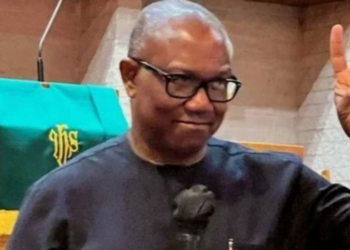 For what it may be worth, Nigerians are very spiritual people. Nigerians of all religious inclinations wear our religions on our foreheads, pray at public functions, make a show of religiosity at all occasions and seem to be in a competition to outspend one another to demonstrate religiosity. Indeed, for most of us, religion is an important part of our identities.
For what it may be worth, Nigerians are very spiritual people. Nigerians of all religious inclinations wear our religions on our foreheads, pray at public functions, make a show of religiosity at all occasions and seem to be in a competition to outspend one another to demonstrate religiosity. Indeed, for most of us, religion is an important part of our identities.
The matter of religion is so serious that the forms required to open accounts in some banks have sections where you must classify yourself as either ‘Christian’, ‘Muslim’, or ‘Others’, as if to saycash had a religion. Clearly, we are a bunch in search of, and in need of spiritual nourishment.
But where do we find fulfillment? How do we make up our minds about which religion to adopt? What determines religious convictions?
Like most people in the world, we have little say in what religion we practice; simply find ourselves in the religions we were born into. True, a few convert to other religions for the sake of marriageor are drawn in by the promise of money and professional success. Some are ensnared by envisaged miracles, or the prospects of meeting marriage partners. In the end, only a few people adopt, convert to, or remain in religions out of genuine conviction nourished by knowledge.
And for something as important to Nigerians as religion, that is a very dangerous thing. It is dangerous because wherever opportunity exists – and who can deny that the need for spiritual nourishment provides untold opportunities – then opportunists step in.
Flipping across television channels some time ago, I fortuitously stopped at one station where I saw a man gesticulating wildly, walking up and down a stage in frenzy and affecting a fake accent. The performance reached a crescendo when the man took off his designer jacket, threw it on the floor and screamed something at the top of his lungs, to tremendous applause from the floor. Any rock band would have been proud of the performance and resulting ovation.
Upon closer inspection, I discovered that the man was not an entertainer, (at least, not in the traditional sense) and the audience was not attending a concert. He was a pastor, and the adoring crowds were members of his congregation. Welcome to the world of some new generation churches and pastors.
Eventually, Idiscovered quite a number of such programmes on television, especially on weekends. Indeed, there are a number of channels dedicated entirely to such programmes, while some churches actually own television channels where they air programmes from their congregations in Nigeria and other parts of the world. The pastors are usually good-looking, suave, and very articulate. They are also well-dressed; seem physically fit, full of confidence and confidence inspiring – from what I could see of the adoring followers.
Incidentally, nearly the same sets of circumstances existamong Nigerian Muslims. I have also observed a number of Muslim preachers receive the kind of adulation usually reserved for rock stars, famous actors and actresses as well as sportsmen and athletes. It is particularly distressing to see dreamy-eyed young men scream “Allahu Akbar!” to whatever these preachers say, without really understanding what is being said.
One explanation is that millions of youth spend their early childhood in today’s abused almajiri schools where they learn little about the core values of Islam. Mindlessly memorizing verses of the Quran without understanding their meanings, context and application does not amount to real knowledge about the key aspects of Islam, or the essential aspects of worship that is the foundation of the religion.
More often than not, instead of kindness to other human beings, understanding the need to live in peace with other human beings, justice, fairness and equity, all some of these young Muslims dream of is jihad. Unfortunately, even the meaning of the term, jihad, is badly misconstrued. Jihad is about the struggle to be righteous; it is about loving our neighbours as we love ourselves. Jihad is about exhorting one another to truth, endurance, and perseverance and about differentiating the nature of good from evil.
This level of ignorance is not restricted to young almajiris and other impressionable young minds. Many mature, life-long and seemingly intelligent Muslims also face similar predicaments because they have refused to, or are unable to read and understand the Quran and Hadith in their true spirit and therefore, often incapable to deciphering the messages of love, kindness, and mercy within.
Consequently, just like some of our Christian folks who merely go to church to be entertained by the gyrations and haranguing of smooth-talking pastors, many Muslims practice Islam on rote, without bothering to explore the spiritual essence of worship and prayer.
So in Nigeria, Muslims and Christians alike, go aboutall assuming to be holier than the other, when in reality, many have lost the fundamental nature of Godliness. That is what happens when unschooled followers follow unregulated preachers.



